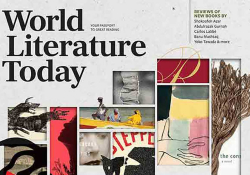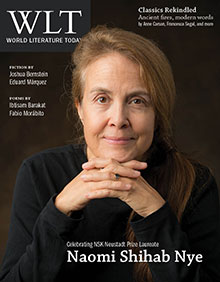Editor’s Pick: The Dailiness by Lauren Camp
 While working on the “Classics Rekindled” section that appears in this issue (page 35), I was struck by the following words from Anne Carson: “Every time a poet writes a poem he is asking the question, Do words hold good? And the answer has to be yes: it is the contrafactual condition upon which a poet’s life depends” (Economy of the Unlost: Reading Simonides of Keos with Paul Celan). In Lauren Camp’s new verse collection, The Dailiness—just released in December by Edwin E. Smith—her implicit answer to Carson’s question is a tenacious “yes.”
While working on the “Classics Rekindled” section that appears in this issue (page 35), I was struck by the following words from Anne Carson: “Every time a poet writes a poem he is asking the question, Do words hold good? And the answer has to be yes: it is the contrafactual condition upon which a poet’s life depends” (Economy of the Unlost: Reading Simonides of Keos with Paul Celan). In Lauren Camp’s new verse collection, The Dailiness—just released in December by Edwin E. Smith—her implicit answer to Carson’s question is a tenacious “yes.”
Many of the themes in The Dailiness reprise earlier preoccupations threaded through Camp’s first collection, This Business of Wisdom (2010): the autobiographical voice of the writer who looks back at herself as “a girl in the middle of my illuminations,” with a determination to fling herself “into the right wounded world,” and the consolations found in the final lines of a poem like “How the Sun Opens Us”: “Even the darkest months make sense, / the steady flaring of empty days. / Even these I am learning to embrace.”
In The Dailiness, we encounter both the quotidian pleasures implied by the title (especially in poems like “The uh-huh of Desire”) as well as many of the deeper themes encountered in Camp’s earlier work: meaning made and unmade; the “inky dark” of memory (especially of her mother); meditations on “the architecture of line” (in southwestern landscapes and in poetry); the versicolorings found in “the tragic palette of time”; modes of grief, disbelief, atonement.
A common trope in both collections is the movement of “folding,” often a retraction from the world’s sharp edges into a personal space marked by intimacy and introspection. We encounter it in four of the opening poems of the book and again in “How I’d Explain What Kind of Mother She Was,” in which the speaker remembers her mother before she was swallowed up by lung cancer, writing: “We loved each other in hidden ways amid the folds / and tucks” of mannequins’ gowns viewed through the “Christmas-crazed windows” of Manhattan department stores. Against the grain of a dailiness marked by “the obituary of days / always buried in days,” Camp counters by fingering “the scar of memory,” made possible by the folding and unfolding of lines shuttling across the page.
To invoke another writer featured in this issue of WLT, Jean-Paul Michel writes toward the end of his essay: “A work of art would be of little value if it were not such an offering of arms laden. . . . If you want to give something that might be received fruitfully by another, you must give what overflows from within yourself” (page 38). Readers looking for poetry marked by an embrace of life’s overflowing measure will welcome Lauren Camp’s aesthetic of abundance. As she writes at the end of “A Gravitational Lens”: “For the first time in a decade, I am calm, waiting out the banner of wind from the west, and looking both ways into a glowing sea of ruffled light . . .” For a poet who is still “learning to embrace,” we are glad to accept the bounty of arms laden with such treasure.
Daniel Simon
Editor in Chief


















